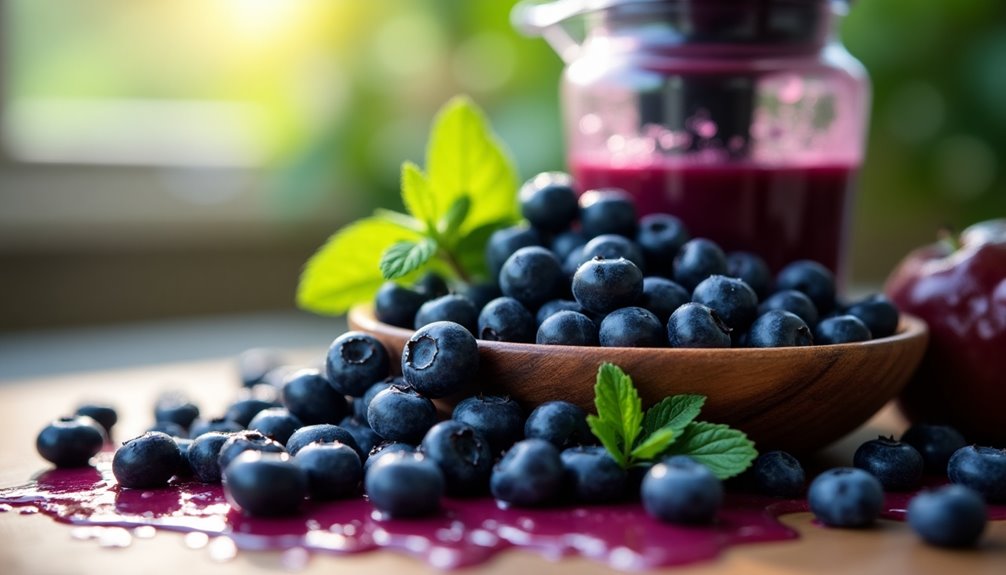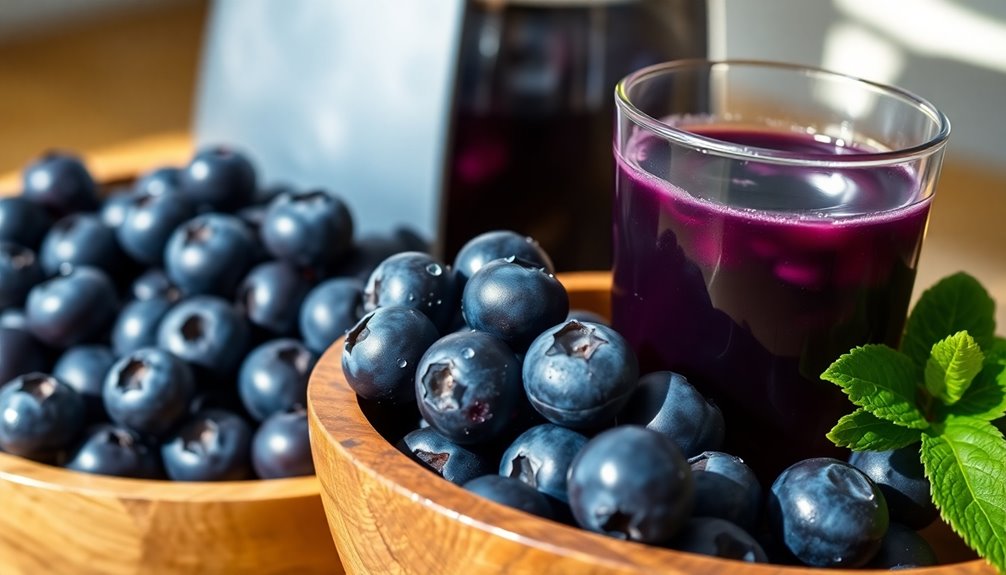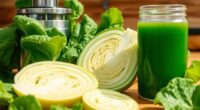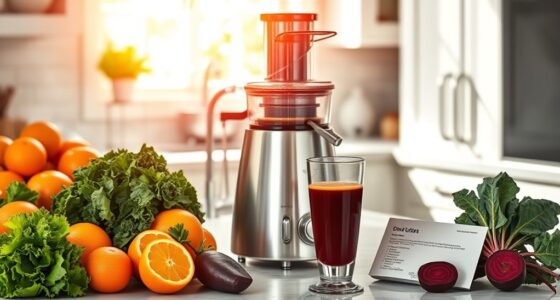To make blueberry juice, start by rinsing and soaking fresh or frozen blueberries in a vinegar and baking soda solution for 15-20 minutes to remove impurities. Blend these blueberries with water and lemon juice until smooth, adjusting sweetness to your liking. Then, strain the mixture through a mesh sieve or cheesecloth to collect the juice, pressing down to extract all the flavor. You can learn more about storing and serving your refreshing blueberry juice next!
Key Takeaways
- Rinse and soak blueberries in a vinegar and baking soda solution to remove pesticides and dirt before use.
- Blend soaked blueberries with water and lemon juice until smooth, adjusting sweetness to taste.
- Strain the blended mixture using a mesh sieve or cheesecloth to extract the juice.
- Collect all the juice and consider blending the pulp again for additional extraction.
- Store blueberry juice in the refrigerator for up to a week or freeze in ice cube trays for longer preservation.

Making your own blueberry juice is easier than you might think. With just a few simple steps, you can create a deliciously refreshing beverage that not only tastes great but also offers numerous health benefits. Whether you've got fresh blueberries from a local market or some frozen ones in your freezer, you can whip up flavorful blueberry juice in no time.
Start by rinsing 1 cup of fresh blueberries under cold water. To ensure they're thoroughly cleaned, soak them in a solution of vinegar and baking soda for about 15-20 minutes. This step removes any lingering pesticides or dirt, so your homemade blueberry juice is as pure as can be. After soaking, drain the blueberries and give them another quick rinse under running water.
Next, it's time to blend. In a blender, combine the soaked blueberries with 1 cup of water and 1 tablespoon of fresh lemon juice. The lemon juice not only enhances the flavor but also adds a nice zing that balances the sweetness of the berries. Blend everything until smooth, and if you prefer your juice a bit sweeter, you can adjust the taste by adding 1-2 tablespoons of sugar or your favorite alternative sweetener. This part is all about personal preference, so make it just how you like it!
Once you've got a smooth mixture, you'll need to separate the juice from the pulp. For this, grab a mesh sieve or a piece of cheesecloth. Place it over a bowl and pour your blueberry blend into it, using a spoon to press down and extract as much liquid as possible. You want to get every last drop of that vibrant juice!
If you prefer a thinner consistency, don't hesitate to dilute the juice with more water to your desired thickness. If you notice that the pulp still holds some juice, you can blend it once more and repeat the straining process.
Now that you have your homemade blueberry juice, you can store it in the refrigerator for up to a week. If you want to keep it for longer, consider pouring it into ice cube trays. This way, you can freeze the juice in convenient portions, making it easy to enjoy whenever you want a refreshing drink. Just pop a few cubes into a glass of water or lemonade for a burst of blueberry flavor!
Frequently Asked Questions
Can You Juice Blueberries?
Yes, you can juice blueberries! They're packed with flavor and nutrients, making them a great choice for fresh juice.
To extract their juice, you’ll need to heat the berries with some water, which helps release their natural sweetness. Once you strain the mixture, you’ll have a thick, delicious juice that you can enjoy as-is or dilute with water. You can also enhance the flavor by adding a touch of lemon juice or honey, depending on your preference. For those looking to learn how to prepare blackberry juice, it’s essential to choose ripe, plump berries for the best taste. After straining, consider using the leftover pulp to add texture to muffins or smoothies, ensuring that none of the berry goodness goes to waste.
Plus, it's rich in antioxidants, so it's a healthy option too!
How Do You Extract Juice From Berries?
Extracting juice from berries is like unleashing a flavor explosion! First, rinse those vibrant gems to rid them of dirt.
Next, blend them with a splash of water until they're a silky potion.
Now, grab a fine-mesh sieve or cheesecloth and strain that luscious mixture, coaxing every drop from the pulp.
Don't hold back—squeeze it for every last bit!
If you want more, repeat the process to maximize that sweet, juicy goodness!
Can We Drink Blueberry Juice Daily?
Yes, you can drink blueberry juice daily! It's packed with antioxidants and can boost your heart health and cognitive function.
Just remember to keep an eye on portion sizes—about one cup is a good serving. Opt for homemade or low-sugar varieties to avoid excess calories and sugar.
While the juice has fewer fibers than whole blueberries, it can still support your digestive health when included in a balanced diet.
Enjoy!
How to Juice Berries Without a Juicer?
If you want to juice berries without a juicer, start by washing your berries thoroughly.
Then, blend them with a bit of water until smooth.
After blending, strain the mixture using a fine-mesh sieve or cheesecloth to separate the juice from the pulp.
Squeeze well to get every drop of liquid.
For extra flavor, try adding a splash of lemon juice before blending.
Store any leftover juice in the fridge or freeze it for later use.
Conclusion
Making blueberry juice is a simple, rewarding process that brings the vibrant flavor of fresh blueberries to your glass. You've harvested the berries, you've blended them to perfection, and you've strained out the pulp for a smooth finish. Now, you can savor the sweet, tangy goodness that nature provides. So, pour yourself a glass, share it with friends, and enjoy the health benefits that come with every sip. Cheers to your delicious creation and the joy it brings!
Cindy thoroughly researches juicing trends, techniques, and recipes to provide readers with practical advice and inspiration. Her writing style is accessible, engaging, and designed to make complex concepts easy to understand. Cindy’s dedication to promoting the advantages of juicing shines through her work, empowering readers to make positive changes in their lives through the simple act of juicing.











